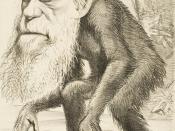This is partly due to the fact that science and philosophy only separated about the time evolutionary theories were being first proposed, but also because - especially in the Darwinian context - evolution was opposed to many cherished philosophical doctrines.
The first main criticisms of evolution lay in the idea that species were eternal types, and so by definition species could not change. More recently, criticisms have rested on the notion of science itself, that evolution fails to meet the standards of true science, views that also were expressed at the time of Darwin and earlier. If we are to understand these criticisms, we must understand the philosophy of science in some detail.
Many other topics of philosophical debate have been raised, and they are briefly reviewed: reductionism, progress and directionalism, teleology, naturalism, and evolutionary ethics. Not all of them are related to creationism, but all apply to antievolutionary arguments by those working from a humanities slant.
Finally, the view has been put, even by philosophers like Popper who admire and accept evolutionary theory, that it is a tautology and metaphysical rather than science.
My conclusion is that evolution, especially the modern theories, is science at its best, and when it and the nature of science are considered realistically, evolution is not lacking from a philosophical perspective. This essay will deal with these philosophical questions and misunderstandings about evolution:



Evolution
your essay seems to be part of a greater essay, it seem a bit wandering.
please remember that darwin only really was able to give evidence for microevolution, and others took that to mean that there was a possibility for macro evolution, somthing that is a great deal different that micro. there is much evidence that ancient peoples had more knowlage than we do today, and there is absolutly NO missing links, as a matter of fact, respected scientists have been caught fudging the facts, and there are many textbooks that have published lies in them, being taught to students as fact.
0 out of 0 people found this comment useful.